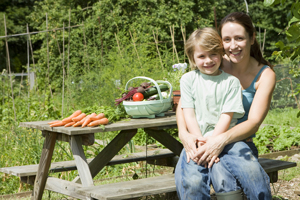Vermont Food Access in Health Care (FAHC) Consortium
- Need: To integrate healthcare with access to nutritious food in rural Vermont.
- Intervention: The Bi-State Primary Care Association and three FQHCs created food programs: Medically Tailored Meals, Produce Prescriptions, and Social Grocery Store.
- Results: These programs screen people for food insecurity, distribute food, offer health education sessions, and help people complete applications for other food programs.
Description

The Vermont Food Access in Health Care (FAHC) Consortium is a partnership of the Bi-State Primary Care Association and three Federally Qualified Health Centers (FQHCs): Lamoille Health Partners (LHP), Little Rivers Health Care (LRHC), and Northern Tier Center for Health (NOTCH). Each FQHC has implemented a food program: Medically Tailored Meals, Produce Prescriptions, and the Social Grocery Store initiative. A webinar that highlights each of these programs in more depth can be found on the Food Access in Health Care website; click on “Health Center Food Programs” under “Food as Medicine.”
The Bi-State Primary Care Association received a 2021-2025 HRSA Healthy Rural Hometown Initiative outreach grant, which has been extended for another year.
Services offered
Medically Tailored Meals Program
The Medically Tailored Meals Program prepares and distributes healthy meals to LHP patients diagnosed or considered at risk for heart disease. It partners with University of Vermont Extension, Meals on Wheels, and other food delivery services to reach patients in rural Lamoille County. LHP creates a newsletter with heart-healthy recipes and other information to be delivered with the food.
LHP also partners with a nonprofit to deliver surplus vegetables from local farms through Meals on Wheels or have this produce available for pick-up. Drop-offs occur every other week during the summer and fall and once a month during the winter. LHP also stores food in a freezer, available to patients as needed, in the waiting room of its Morrisville clinic.
Registered dietitians on the LHP Community Health Team provide support and cooking equipment to patients who need it.
Food Farmacy
LRHC patients who screen positive for food insecurity and a chronic health condition are referred to the Food Farmacy. LRHC distributes Community Supported Agriculture (CSA) shares from a food gleaning farm and served 110 patients in 2024.
LRHC has also partnered with the Vermont Foodbank to create shelf-stable food boxes for patients with type 2 diabetes and/or hypertension.
Social Grocery Store and Produce Prescription Program
NOTCH's nonprofit social grocery store in rural Richford, Vermont, offers free samples of healthy food, healthy recipe cards, cooking instructions, and coupons for healthy foods.
NOTCH also has a CSA produce prescription program for eligible patients. Since May 2023, 73% of participants have picked up or received more than half of their shares at one of eight NOTCH clinics. NOTCH is looking to implement a point-of-sale system at the social grocery store so that participants can buy their produce prescriptions there. NOTCH is a recipient of a Gus Schumacher Nutrition Incentive Program grant, which will help fund the point-of sale system at Main Street Market.
Results
LHP: As of July 2024, LHP included 70 participants in their food program and distributed 5,395 meals.
LRHC: As of July 2024, LRHC included 92 participants in their food program and distributed 68,669 pounds of fresh produce to participants. LRHC also set up 4 mini-pantries with shelf-stable food items in each of its centers, which are available to all patients. LRHC received additional funding to secure a cooler and bags to safely store food.
NOTCH: As of July 2024, NOTCH included 93 participants in its food access programs and offered 109 unique health education opportunities to eligible participants.
The three health centers made a statistically significant positive impact in food program participants' blood pressure and cholesterol.
Challenges
General barriers include transportation issues and falsely low positive screening rates (people who are food-insecure but are not identified during the screening). Sustaining each program with funding is a significant challenge, as Vermont does not have a reimbursement system in place for medically tailored meals.
Replication
The Vermont FAHC Consortium meets quarterly to discuss the three programs.
Contact Information
Kristen Bigelow-Talbert, Senior Program Manager of Health QualityBi-State Primary Care Association
802.229.0002 Ext. 220
kbigelow@bistatepca.org
Topics
Food security and nutrition
States served
Vermont
Date added
March 19, 2024
Suggested citation: Rural Health Information Hub, 2025 . Vermont Food Access in Health Care (FAHC) Consortium [online]. Rural Health Information Hub. Available at: https://www.ruralhealthinfo.org/project-examples/1135 [Accessed 4 January 2026]
Please contact the models and innovations contact directly for the most complete and current information about this program. Summaries of models and innovations are provided by RHIhub for your convenience. The programs described are not endorsed by RHIhub or by the Federal Office of Rural Health Policy. Each rural community should consider whether a particular project or approach is a good match for their community’s needs and capacity. While it is sometimes possible to adapt program components to match your resources, keep in mind that changes to the program design may impact results.
